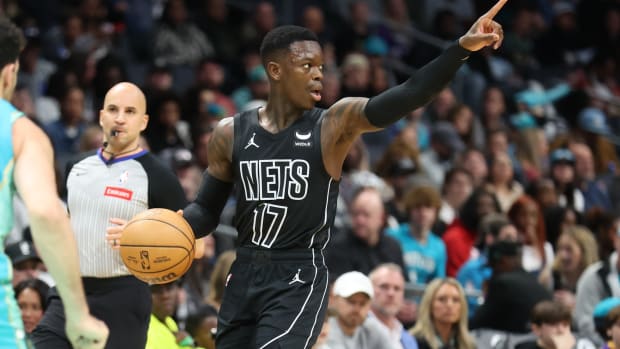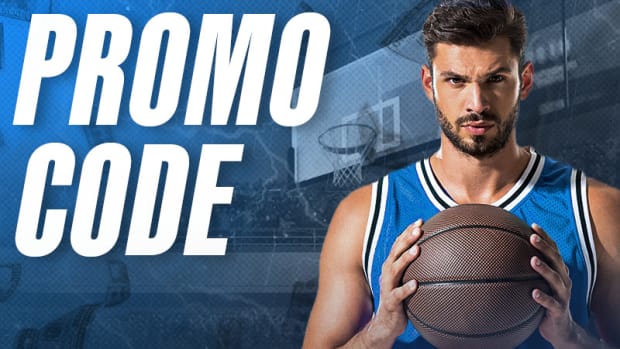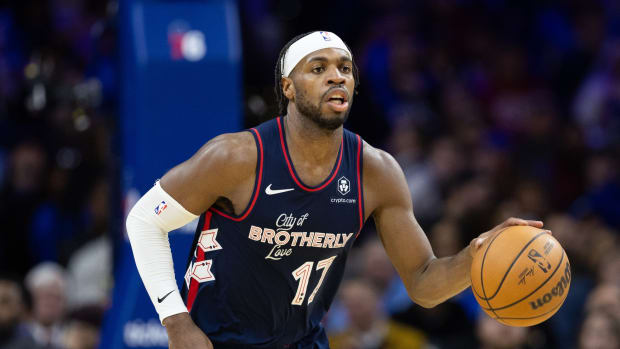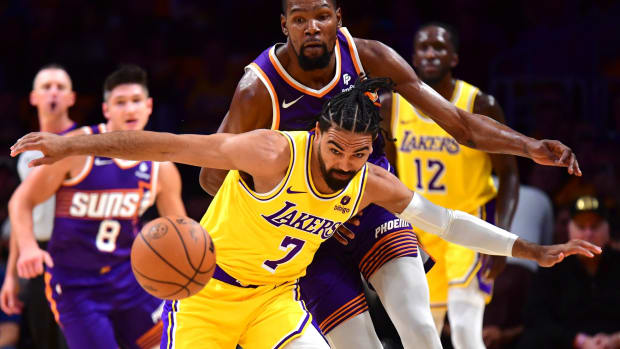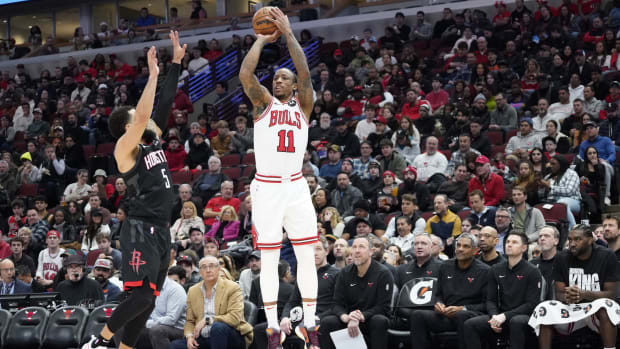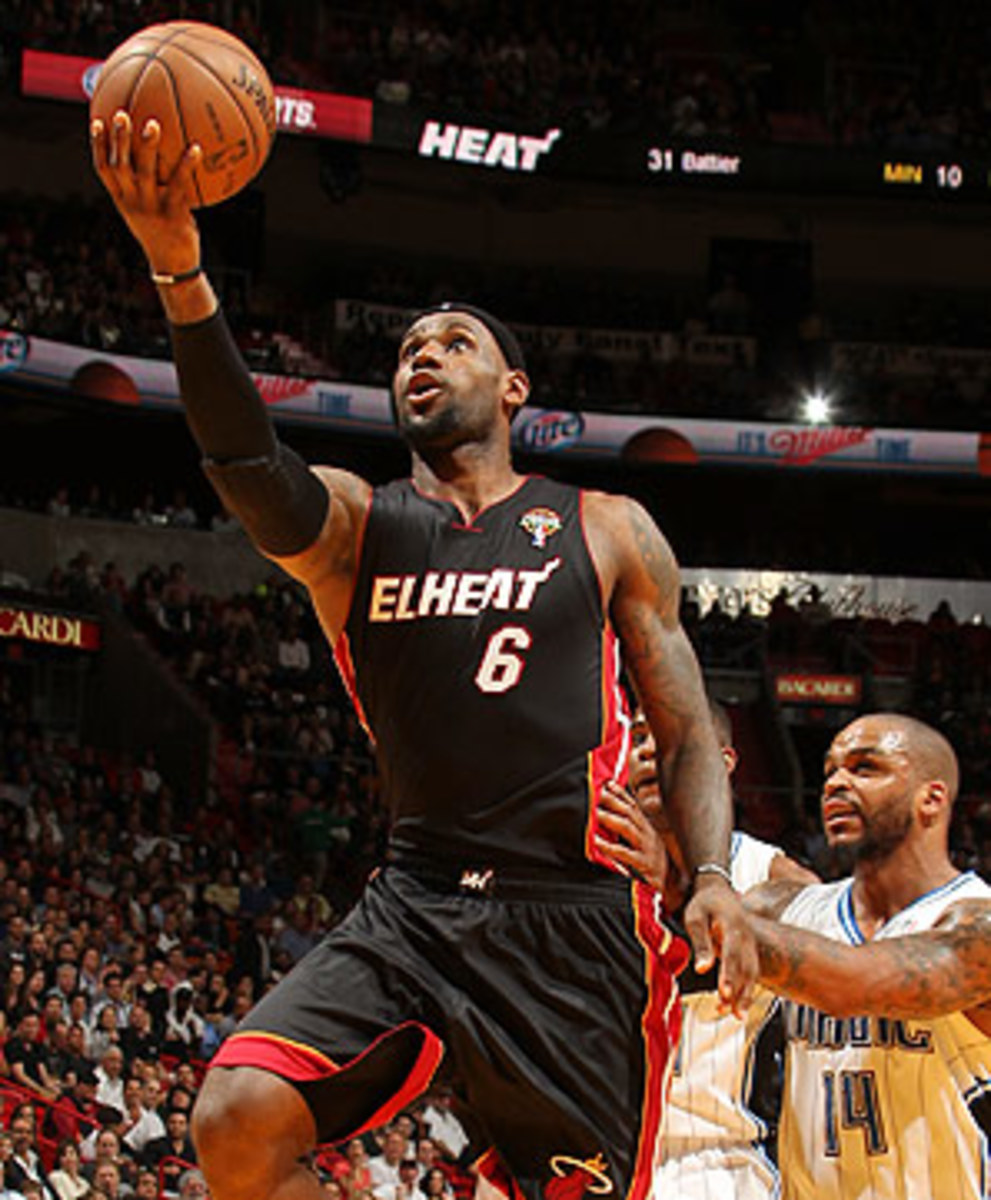
Questions remain, but Lakers always know they can count on Kobe
NEW ORLEANS -- Kobe Bryant's shooting elbow had been injured Tuesday night in a loss at Oklahoma City. When Mike D'Antoni sought him out the next day, Bryant's answer was abrupt and soothing.
"Don't worry about me," he told his coach. "The ball's going to find its way in the basket somehow."
There have been too many worries and too few resolutions for too many nights of this long Lakers season. The reliable and altogether lonesome consolation has been the play of Bryant, who, a few hours after his words of reassurance, generated 17 points on 10 shots for the Lakers -- by halftime. Before the second half started, he was in the visitors' locker room Wednesday night with teammates who had each scored five points or fewer. They were losing 67-48 to the Hornets and Bryant was talking to them about the challenge and the opportunity of coming back to win in the second half.
"I was thinking I've got to bring my teammates along," Bryant said after their pivotal 108-102 comeback win. "I knew I could score anytime I wanted to, but I said, I've got to bring them along with me. I've got to force the game upon them and hope it turns the tide."
They outscored the overwhelmed Hornets 33-9 in the fourth quarter because Bryant, in the end, was not alone. Dwight Howard, impotent with foul trouble in the first half, held the Hornets scoreless over the final 6:47. No star can protect the paint like a healthy Howard, and at last he looked like himself again. After a Robin Lopez dunk put the Hornets up 102-88, they missed all 12 of their remaining shots while adding four turnovers.
At the other end, Bryant was finishing a second half of 25 points (on 9-for-11 shooting) and 11 assists (with one turnover) in 24 minutes. Less than 24 hours after his elbow went dead and the Lakers arrived in New Orleans late, the five-time champion in his 17th year played 42 minutes and scored 42 points with 12 assists and seven rebounds overall.
[Kobe dunks on Josh Smith in recent win over Hawks]
The before-and-after difference in the locker room had to be startling and, Bryant hopes, inspiring. Happy with this moment of confidence, they watched the Rockets lose in Dallas after finding out that the Jazz had already lost in Cleveland. The Lakers are now 1½ games behind No. 8 Utah and two back of Houston.
"Can you imagine if we had lost this game?'' Bryant said with a huge winner's grin. "They would have burnt the city down. I mean, we would have bounced back. But you look at Houston having a tough one tonight and Utah losing tonight and we drop this one that we're supposed to get? That's just not acceptable."
He was almost laughing as he said it. But the Lakers weren't ready to call this rally from a 25-point deficit a turning point. The first three quarters were proof that their issues haven't been resolved.
"We haven't had a training camp with Mike and we've got a lot of new guys that haven't played together, let alone trying to learn a new system and trying to learn each other too," said Steve Nash, who was limited to five points and one assist in 35 minutes while deferring to Bryant. "We don't run Mike's system, really, so we're in between trying to figure out what we are, who we are, how we're going to play."
Nash talked of the need to work Pau Gasol back into the rotation. More hope, more complication.
"We've been winning at a high clip for the last five weeks or so, but we still have a long way to go," Nash said. "And we still don't necessarily know, almost from night to night, which form of our team is going to appear.''
Their hopes depend on Howard, who contributed 20 points, 15 rebounds, four blocks and three steals. Bryant accepted zero credit for inspiring any of it.
"It's just part of how we did it together -- that's the most important thing, we didn't fold," Bryant said. "Like Dwight -- the game wasn't going his way offensively, he was getting fouled, it wasn't getting called, and he just said to hell with it, I'm just going to dominate the game on the glass, I'm going to dominate the game defensively. You've got to look at the shots that he changed, the runners from [Eric] Gordon, from [Greivis] Vasquez, the deflections, the steals. That's really what turned the tide for us."
[Metta World Peace gets long-overdue poetic treatment]
Bryan finished the game-ending 20-0 run, predominantly via pick-and-rolls with Howard down the stretch. But the most standout play came with the Lakers ahead 104-102 with 30 seconds left, when Howard contested a drive by Gordon and then immediately recovered to block a dunk by Lopez after Gordon had dished to him along the baseline.
"It was incredible," Bryant said. "I saw it coming. I knew Lopez was going to challenge him, and I knew Dwight was going to go for it. I knew he was going to get it. It was just a matter of whether the ref was going to call a foul or not.
"I didn't bring him. He brought himself along. I didn't do anything. That's a conscious decision he made: I'm going to dominate the game on this end of the floor and there's nothing anybody's going to be able to do about it."
Howard talked afterward about the Lakers' need to build on this fourth quarter defensively, and Bryant spoke of the bonding and toughening of his team. Both of them knew it was all a lot of talk that amounts to nothing. All that matters at this late hour is whether they can extend the performance of Wednesday to a second quarter, and then three or four quarters, and then to do it against the superior teams in the league while eventually working Gasol back into the rotation.
This does not look like a team that can turn hot to win eight or nine in a row. Improvement will be made incrementally, but nothing will come easily. There is a lot of work yet to do, and even now, on such a promising night, the only thing D'Antoni doesn't need to worry about is Bryant. As happily as he was celebrating this win on the floor, he was also recognizing that nothing had been accomplished. His feet sat in a bucket of ice as he thought about whether he'll be remembering this evening years from now.
"Man," he said, "if I've got to remember this game years from now, my career has got issues."
Six weeks to go, and the ball's going to find its way in the basket somehow.
The Headlines
? Heat win 16 straight. LeBron Jamesfinished a drive to beat the visiting Magic 97-96 Wednesday. It was James's first game-winning basket in the final five seconds since 2009. Miami hasn't lost since Feb. 1 at Indiana. Against a backdrop of injured or otherwise weakened rivals, the Heat are relatively healthy -- and so long as they remain that way, no one is going to beat them in a seven-game series.
? Tony Parker injured. The Spurs' point guard was expected to miss four weeks after suffering a Grade 2 left ankle sprain last Friday. Of all the extended absences that might have been inflicted on San Antonio, this promises to be the most painful. There was a time when Parker was viewed as the weak link of the Spurs' starring triangle, but over the last two years he has emerged as an MVP candidate in his prime years who has kept elderly Tim Duncan and Manu Ginobili -- along with the Spurs' wealth of role players -- in contention.
[GOLLIVER: Ranking the NBA's top 10 point guards]
The Spurs will hope that the likes of Kawhi Leonard and Danny Green step into the vacuum of leadership and gain confidence, and that Parker will be at full strength and back on top of his game in time for the playoffs. They are contending for the championship for a 16th straight year, so it's not as if they haven't overcome setbacks before now.
? Sacramento makes its case. Mayor Kevin Johnson delivered to the NBA details of an alternative offer to purchase the Kings in order to keep them in Sacramento with plans for a new arena. The task force known as "Think Big Sacramento" put forth a report that raised the question of whether a single pro franchise in its market would be more valuable than an NBA team in Seattle competing for support among several pro teams.
Commissioner David Stern has publicly washed his hands of this mess and left the decision up to his owners. How many of them are going to step forward and tell the Maloof family to not sell the team to Chris Hansen's group in Seattle? It is an unlikely precedent, in that none of those owners will want to face a similar limitation when he or she puts a franchise up for sale someday. Perhaps the courts will have their say.
? Rockets sign Aaron Brooks. The 28-year-old point guard was released by the Kings and returned to Houston, where his up-tempo game should fit beautifully with the Rockets' high-scoring style. This was a big pickup as the Rockets are competing with the Jazz and Lakers for the final two playoff spots in the West.
? Serge Ibaka avoids suspension. Players around the league were wondering why the Thunder power forward endured nothing worse than a $25,000 fine after punching Blake Griffin in the groin Sunday with 1:52 left in Oklahoma City's 108-104 win against the Clippers. As tweeted by LeBron James: "So explain to me the difference? My teammate gets a 1 game suspension and 150k+ taking away from him for his groin altercation #strangetome"
James was referring to Dwyane Wade, who in December kicked Charlotte's Ramon Sessions in the groin. Tweeted Wade: "... and I get suspended and lose 200 grand... #someexplainingtodo"
Griffin tweeted a joke about needing to wear a protective cup. But others weren't laughing.
"You can INTENTIONALLY grab or hit someone in the (groin) & not get suspended, but you push someone & get suspended. #ImConfused" tweeted Matt Barnes, who was suspended for one game after he received a flagrant 2 for shoving the Timberwolves' Greg Stiemsma in the neck. "So if I would have back handed Ibaka, I would have been the only one to get suspended right??????????????????????????"
The players are basically arguing that they don't understand the lines of gray area that separate excessive and acceptable behaviors. While the league office was upgrading Ibaka's incident from a flagrant 1 (as assessed during the game by referees) to a flagrant 2, it was also ruling that Minnesota's J.J. Barea should not have been ejected Monday for knocking down Ray Allen, which will spare Barea from a fine or suspension for what should have been a flagrant 1.
"The NBA did a good job looking at it," Barea said after practice Tuesday. "It wasn't that bad. It's all right."
? More surgery for Andrew Bynum? The Philadelphia center met Tuesday in New York with his orthopedist, Dr. David Altchek, as he contemplated arthroscopic surgery on his sore knees that would bring absolute closure to a season in which he never played for the 76ers. They dealt Andre Iguodala, Nikola Vucevic, Moe Harkless and a future first-round pick in the four-team trade for Bynum. Coach Doug Collins has already had one public meltdown, and the team finishes this lost year with 12 of 16 games on the road. The Sixers probably haven't bottomed out yet.
Get To Know: Russ Granik
The former NBA deputy commissioner was elected recently to the Naismith Basketball Hall of Fame as a contributor. Granik left the NBA in 2005 after 30 years, including the last 22 as deputy commissioner under David Stern.
? He grew up playing basketball as a 6-foot-4 high school big man in Spring Valley in suburban New York.
"I was a fanatic as a kid," Granik said. "All I lacked was real talent. I never played beyond high school and I got cut from an Ivy League team -- that tells you how good I was or wasn't. I had a hoop in the backyard and I played all the time. I hear these stories about great players and how hard they worked when they were younger, and I think to myself, I bet I played as hard as they did. But I was slow and skinny.
"I guess I can answer this now that I don't work for the league. My favorite team was anyone who might beat the Celtics. My favorite player probably was Elgin Baylor. He seemed to bring a lot of different things to it that people hadn't seen before -- his ability to go to the hoop and hang in the air and score from anywhere. He seemed like a classy kind of player, and in all the sports I followed, I always gravitated to guys who didn't make a lot of fuss and just played hard.
"When I was at Dartmouth in my sophomore or junior year, they brought in a new head coach, Dave Gavitt. I didn't meet him until years later. I told him I had been at Dartmouth and he said, 'I didn't cut you, did I?' I said no, that was your predecessor."
After graduating magna cum laude from Dartmouth and cum laude from Harvard Law School in 1973, Granik worked for a New York law firm alongside a young colleague, Larry O'Brien III, the son of the NBA commissioner.
"He knew I was a basketball fan," Granik said. "After I had been at the firm a couple of years, he said, 'My father is thinking of hiring a lawyer because there are no lawyers on the staff.' Now there are 30 or something at the NBA. But he said, 'Would you like to go meet him?'
"Now, Larry O'Brien was a major hero. Watergate took place when I was in high school. It was probably the biggest single news event of my time in law school. Larry O'Brien was the chairman of the Democratic National Committee and it was his office that had been burgled. He was a very prominent national figure -- the [John F.] Kennedy campaign manager, and [Lyndon] Johnson's postmaster general. If you were a liberal-leaning young lawyer in the early '70s, he had to be a hero of yours. Just for the chance to meet him and talk to him, I said sure.
"Despite my lack of relative experience, he offered me a job. I said yes, even though a lot of people I knew -- family and friends -- thought that was crazy. I remember very well my father saying, 'If you can work for somebody like Larry O'Brien, you'd be foolish not to.' But a lot of other people were saying, 'What does a commissioner even do? He goes around a couple of times a year and hands out trophies, but what else does he do?' That's what a lot of people thought about it back then, including the owners.
"The NBA had half a floor in 2 Penn Plaza right next to Madison Square Garden, which meant the league office was a tenant of Madison Square Garden. That was something Larry O'Brien from Day 1 wanted to change and did change a year after I got there. I think I was the 22nd person on the staff. Matt Winick [the longtime senior VP who puts out the annual NBA schedule] started a month before I did. He was No. 21 and I was No. 22. There was no NBA entertainment, no NBA International -- that was the entire organization."
? Granik helped in a variety of areas after joining the NBA in 1976 as staff attorney.
"The greatest experience I had was I got to work on so many things," he said. "Now, if you join the league as a lawyer, you're either doing transactions or NBA Properties work or a you're a litigator. But I was the lawyer in-house, and I also got to work on things that had nothing to do with legal issues. I wrote speeches for O'Brien. I was sort of the de facto public relations head for few months in that first year when we were in between PR directors.
"A pretty fair percentage of the time you could have been working in any business, because you had a business and legal job to fulfill. But almost every day there was something to do with basketball, even if it was just conversations with Joe Axelson [the former team executive who became NBA director of operations], who joined the office after me. Eddie Gottlieb [the former Philadelphia Warrior for whom the Rookie of the Year award is named] would come in two or three times a week and sit and talk basketball with you. There was always some element that would come up about the game and make the work a little bit different from anything else. It really helped that I had been a fan, because when somebody talked to me about Bob Pettit or Jack Twyman, I knew who they were."
He worked closely with Stern, who since 1966 had served as outside counsel to the NBA.
"David had pretty much risen to be in charge of the day-to-day legal stuff," Granik said. "I worked almost as much with David as I did with Larry O'Brien, and when it came to legal issues I was really working at David's direction at the time."
Granik was heavily involved in the groundbreaking 1983 negotiations with the players' union that led to the first salary cap as well as a new drug-testing policy that together helped transform the NBA.
"The relationship back then was decent," Granik said. "Larry Fleisher pretty much ran everything from the union side. He was the No. 1 agent and head of the union, which is something you don't see anymore. He was the guy you had to deal with, and he had a very professional view of things. His job was to make the best deal he could for his players without hurting the league. He understood if you pushed too far, it wasn't good for anybody.
"It was a good pairing, because Larry O'Brien was a practicing politician. The first day you started at the NBA, you had to read Larry O'Brien's autobiography: I think it was called No Final Victories. He believed you were never going to win everything, you were never going to win for all time, you negotiated the best you can and do the best you can and then try to win another time. He taught David and me a lot of lessons in how to deal with a lot of issues. And then I learned from David that you don't take anything personally that happened in your legal dealings.
"One thing that has always been interesting to me is that some of the very best guys as players tend to get involved in the union. I'm not criticizing players who don't get involved in the union, because a lot of great guys haven't been. But when I started, Paul Silas had just taken over as union leader, then you had Junior Bridgman and Bob Lanier -- these were the guys in my first 10 years who were heads of the union, and they were pretty substantial people who went on to do good things in their lives beyond playing.
In some ways, I got to make a lot of lasting friendships with people because they sat on the other side of the table. Buck Williams, Isiah Thomas -- I happen to be a fan of Isiah's -- these were guys who did this for no particular benefit for themselves. They literally put in hundreds of hours, as we did, in overheated conference rooms for the good of their organization. For the most part, I found those players were outstanding people.
"We actually concluded the salary-cap deal with that collective bargaining agreement first, but with the understanding that both sides wanted an anti-drug agreement. The same group sat down to negotiate. Bob Lanier was the union president and Larry Fleisher was the executive director.
"Our drug agreement was remarkably different from any other league's. It was really true that the players' association wanted it as much as the league did. The NBA in that era got painted with the brush of being a bunch of drug users. It was very unfair that the NBA got more of the brunt of it than any of the other leagues at the time. Most of the players felt that was unfair and they wanted to do what they could to put that behind them. Most NBA players didn't like to meet someone on the street who would assume they must be drug users if they played in the NBA. The players were more adamant about doing deal than we were.
"It was much different from the collective bargaining agreement. It was more about sitting down and talking about what did we think made sense. Obviously, that first drug agreement wasn't one that would withstand scrutiny now, but for that time, it was groundbreaking. David tells the story all the time that we came up with the notion that a player could be banned for life -- but could reapply to play in the league after two years. What the union wanted was that if you were caught, you were banned for life. It was really our side and David saying, 'Aren't you entitled to some mercy? Maybe a person can turn his life around. Let's call it a lifetime ban, but let's give them an opportunity.' It really was the opposite of how people might have thought that came about.''
? Granik was placed in charge of the original Dream Team project in 1989. By then he was the deputy to commissioner Stern, and FIBA had voted to allow professionals to play in the Olympics starting in 1992.
"David said to me, 'I think it's better if someone other than the commissioner is in charge of this for the NBA,' " Granik said. "So I became the chief representative from the NBA to USA Basketball and FIBA, and worked to see if it made sense to let NBA players play in the Olympics. Dave Gavitt [who was in charge of USAB] immediately had me elected vice president of USA Basketball, and he and I together really mapped out where it would go.
"We only came to realize the full potential gradually. I don't think we ever thought the Dream Team would turn out to be as big a thing as it became. I don't see how we could have contemplated that. What we immediately saw were the roadblocks -- though we were always of the attitude that you could knock roadblocks down one by one if you worked hard enough. But there were many commentators who immediately started saying this would never happen, it was ridiculous, players will never give up their summers, owners would never let them play, sponsors would never get involved.
"We had to work out some structure with the college community, which had been in control of USAB prior to that point. We had to work out with them some kind of structure where we could select the coaching staff and team in a way that the NBA and the NBA owners could be comfortable. We were going to have an NBA head coach [Chuck Daly], and we made a deal to have two college assistants and one NBA assistant. Those were the starting problems.
"I always felt getting the players to play would not be a problem, and it wasn't. What a lot of the naysayers didn't understand was that all of these great players loved the idea of playing together in something that mattered. They never got to play together except in All-Star Games, which were fun, but that was not the same thing. The first six or seven players we called, the response was, If you're going to have this guy and this guy, then I'm in. Nobody wanted to be the only star. But once they could see it might be a chance for all of the superstars to be coming together, then they loved it.
"It was not that difficult to convince the owners. Even though there is some dissent these days, I think the owners at that time were unanimous in their view that the exposure the game could get was far outweighing the risk. Fortunately, there weren't serious injuries that came about.
"The sponsors were very difficult. The most difficult part of the whole process was working out that part of it because the Olympics claimed certain rights, USAB claimed certain rights, and our players all had their own relationships and obligations.
"It would have been unbelievable to think that the NBA would become what it has. It really was a struggling sport in the late '70s and early '80s, and to become the worldwide enterprise that it is now would have been unbelievable.
"This sounds crazy, but I remember being nervous most of the time in Barcelona at those 1992 Olympics. Despite everything that seemed to push to the contrary, you know you're watching a basketball game and that something could happen. If we had lost, it would have been a horrible ending to the story. I remember in the final game against Croatia, it was close for much of the first half. I remember Rod [Thorn, then NBA executive VP of basketball operations and now president of the 76ers] and I going out and talking because we couldn't sit down for a little while. I can't say I enjoyed the games that much in Barcelona."
Quote Of The Week
"'I don't want to do war. I don't want to do war.' He said that to me." -- Dennis Rodman recounting a conversation he head with North Korean dictator Kim Jong Un.
By his own account, Rodman became friends with Kim Jong Un, the infamous NBA fan who last year inherited dictatorship of North Korea from his father. Upon returning home last week from his visit, Rodman characterized Kim Jong Un as a victim of his environment.
"Guess what, the kid's only 28 years old," said Rodman, who was basing his opinions on Kim's personal hospitality, as opposed to the details of prison camps and mass famine. "He's not his dad. He's not his grandpa."
Rodman suggested that the U.S. and its self-appointed enemy could establish a relationship through basketball.
"Guess what?" Rodman said. "He loves basketball. [Barack] Obama loves basketball. Let's start there. Both of you guys love basketball so much.''
One question was whether he should have gone in the first place. That led to another question, based on some consternation that Rodman's visit and claims of friendship had provided credibility to a rogue state and its villainous leader. Dennis Rodman is cursed and blessed with a huge entourage of qualities that define him uniquely in the world. Credibility is not among them.
The Breakdown
An NBA advance scout gives his take on the race for the Coach of the Year award:
"Frank Vogel [of the Pacers] is my choice. He missed David West at full strength for a while, he missed Danny Granger all year and he still got them in position to be the second-best team in the East. They started off slowly [10-11], they had tough road trips and still he kept them together and they got better.
"It was out of necessity that Paul George turned into an All-Star for them. They were struggling early in the year, and George was struggling. Then he had a breakout game [37 points against New Orleans] and he took off from there. Without Granger, with West hurting off and on and Roy Hibbert not doing what he did last year, they had to have somebody step up. The thing about Frank is that he continued to give Paul George confidence and kept going to him, because there are guys who would have gotten down on him when he was struggling at the beginning of the year. But Frank believed in him and kept riding him.
"The Pacers are appreciably better on defense, and part of it is because Granger is not playing. And part of that is pace of play and not shooting as quickly, so some of the defensive stats get better that way because they're not playing as up and down as they did last year. They play a grind-it-out game, and it's hard to get players to buy into the mindset of playing that way because they want to get up and down and run -- or at least they say that's what they want to do.
"My next two choices are Tom Thibodeau [Bulls] and George Karl [Nuggets]. With Thibs, they took away all of his bench players and he had no Derrick Rose, and they're still competing every night.
"George has his team playing at a higher level. I've heard he said his goal was to get his team to where they were getting 30 assists, 30 layups and 30 free throws every game, and they're pretty darn close to it now. They've impressed me, and they play pretty good defense while they're doing it, too.
"After those three, I don't know. Some people would go with Kevin McHale [Rockets]. He might get some votes because they're the youngest team in the league and they should probably make the playoffs. There are some who would say that, and then there are some who would say that he's not really doing anything -- it's a team that just goes out and plays, really. There are people who coach McHale's way, and then there are people who coach the other way.
"Mark Jackson [Warriors]? He's in the top 10, but I'm not going too crazy over him. It's the same way as Kevin McHale -- I respect what his team is doing, but I'm not going to go to a Mark Jackson coaching clinic if he puts one on.
"Terry Stotts' team [the Trail Blazers] doesn't have a lot of depth and he's kept them in the mix. They play hard, he's got a very good starting five and he has kept them in the hunt. A lot of his guys are playing well, but that's because he has no other players to play. He has to depend on the same five guys so of course their numbers are going to be better. But Terry is a good offensive coach and I could see the point being made for him to be in consideration.
"Gregg Popovich [Spurs] is someone who would sell-out every coaching clinic he decided to do. That's the guy that other coaches respect and other players respect. You can't say that about everybody in the league. Voting for him as Coach of the Year is like having Michael Jordan win the MVP every year."
If you replaced most coaches with an average NBA coach, would the team suffer? In most cases, the scout wrote in a brief text, there would be no large drop-off.
"I guess if I was voting for Coach of the Year, I would look at the team record," the scout said in a phone interview. "In Pop's case, their record this year is not that much different than it was last year. You look at whether the coach has improved the team, or whether the team has improved its roster under him for that year. Then you look at certain circumstances, like what Thibodeau is going through this year, and how he has been able to bring together some new players and keep them successful. Frank, Thibs and George Karl have three different styles, and to get the team to buy in is the hardest thing to do in the NBA -- and they're all able to get their guys to buy in."
All-LeBron James Team
In honor of James' ongoing streak with the Heat, who won their 16th straight game Wednesday, here is a team of Hall of Fame players (current or future) whose teams won more than 16 games in a row on their way to the championship that season. It's an amazing collection of talent.
Starters
C Bill Russell, Celtics (17 straight in 1959-60) F Tom Heinsohn, Celtics (17 in 1959-60) F Scottie Pippen, Bulls (18 in 1995-96) G Michael Jordan, Bulls (18 in 1995-96) G Jerry West, Lakers (NBA-record 33 in 1971-72)
Reserves
C Kareem Abdul-Jabbar, Bucks (20 straight in 1970-71) C Wilt Chamberlain, Lakers (33 straight in 1971-72) C Shaquille O'Neal, Lakers (19 straight in 1999-2000) G Oscar Robertson, Bucks (20 straight in 1970-71) G Kobe Bryant, Lakers (19 straight in 1999-2000) G Bob Cousy, Celtics (17 straight in 1959-60) G Gail Goodrich, Lakers (33 straight in 1971-72)































